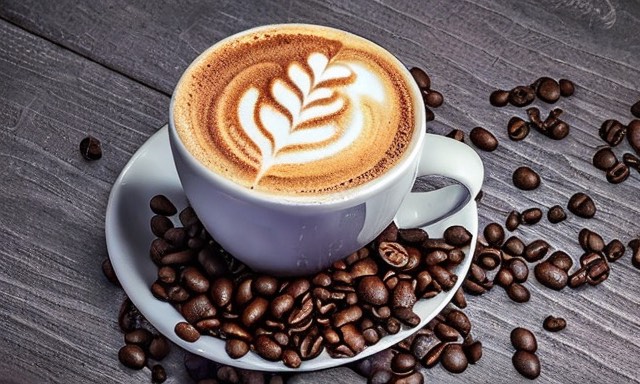Internet Asks: “Does Cappuccino Have Caffeine in It?”
Step into a cozy café, inhale the rich aroma of freshly ground coffee, and take a seat. As you peruse the menu, your eyes land on the classic cappuccino—a velvety blend of espresso, steamed milk, and foamed milk that promises a delightful treat. But wait, you wonder, does cappuccino have caffeine in it? Join us on a caffeinated journey as we explore the secrets behind this beloved coffee beverage.
sponsored links

The Art of Cappuccino
Cappuccino is not just an ordinary cup of coffee—it's a work of art. Crafted with precision and skill, this Italian creation is renowned for its distinctive layers of espresso, steamed milk, and frothy milk foam. The name "cappuccino" is derived from the Capuchin friars' hooded robes, which resemble the drink's color combination of dark coffee and light foam.
It's a harmonious union of flavors and textures that has captured the hearts of coffee lovers around the world.
The Caffeine Conundrum
A traditional cappuccino typically consists of one-third espresso, one-third steamed milk, and one-third frothed milk. The base ingredient, espresso, is a concentrated form of coffee that contains caffeine. As a result, standard cappuccino contains approximately 85 milligrams of caffeine. But the amount can vary depending on several factors.
- The Power of the Beans:
The caffeine content in cappuccino is determined by the type of coffee beans used to make the espresso. Different coffee beans can have varying caffeine levels, so the intensity of your caffeine kick may vary from one cup to another. If you prefer a bolder flavor and higher caffeine content, opt for a dark roast espresso. On the other hand, a lighter roast may offer a milder taste and slightly lower caffeine content. - The Size Matters:
Another factor to consider is the size of your cappuccino. Traditional cappuccinos are typically served in small cups, containing equal parts espresso, steamed milk, and foam. This means that the overall caffeine content of your cappuccino will be lower compared to larger coffee beverages like lattes or mochas, which contain more espresso shots and additional milk.
The Buzz Behind Caffeine
Caffeine, the natural stimulant found in coffee, has a way of awakening the senses and boosting our energy levels. When consumed, it swiftly makes its way into our bloodstream, making us feel more alert and focused. It acts by blocking the receptors for a neurotransmitter called adenosine, which promotes wakefulness and reduces drowsiness. So, that morning cappuccino can be just the right pick-me-up to start your day with a jolt of energy.
sponsored links
Mastering the Cappuccino Game
If you're looking to savor the delightful flavors of a cappuccino but prefer a lower caffeine intake, fear not! There are options to suit your taste buds. Consider ordering a decaf cappuccino, which uses decaffeinated espresso, or opt for a smaller-sized cappuccino to reduce the overall caffeine content. This way, you can still enjoy the velvety texture and indulgent taste without the full caffeine kick.
Embrace the Cappuccino Lifestyle
Cappuccino is not just a beverage—it's a lifestyle. Whether you're sipping it on a brisk morning, meeting friends for a coffee break, or enjoying a quiet moment of solitude, cappuccino brings warmth and comfort to your day. Its creamy foam and balanced flavors create a luxurious experience that transcends the simple act of drinking coffee.
In Conclusion
So, the next time you find yourself craving the creamy goodness of a cappuccino, rest assured that it does contain caffeine, but the amount can be adjusted to suit your preferences. Embrace the frothy delight and savor every sip of this iconic coffee masterpiece. Cappuccino: where espresso meets artistry, and caffeine meets pure bliss.
Disclaimer: The caffeine content in cappuccino can vary depending on factors such as the type and size of the espresso shot, brewing methods, and personal customization. The information provided in this article is for general knowledge purposes only and should not replace professional advice or guidance. Always consult with a healthcare professional if you have specific concerns about caffeine consumption or dietary restrictions.
sponsored links
References
- USDA. Coffee, Cappuccino. https://fdc.nal.usda.gov/fdc-app.html#/food-details/2346034/nutrients
- Harvard School of Public Health. Caffeine. https://www.hsph.harvard.edu/nutritionsource/caffeine/
- The Spruce Eats. What Is a Cappuccino?. https://www.thespruceeats.com/what-is-a-cappuccino-765321
- Kickinghorsecoffee. Caffeine Myths: Dark vs. Light. (n.d.). https://www.kickinghorsecoffee.com/caffeine-myths-dark-vs-light
- Medical News Today. Caffeine content of different types of coffee. https://www.medicalnewstoday.com/articles/324986#other-sources-of-caffeine
People are also reading...
Carbs In Guacamole?
Calories in a Grilled Cheese?
🍍 Are Mangoes Acidic?
Ready to level-up?
Create meal plans 10x faster, follow up with your clients through our mobile app, and never struggle with meal planning or recipe management again.